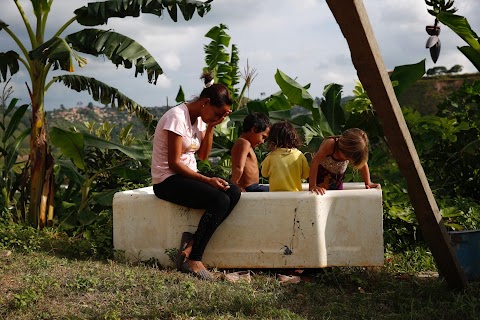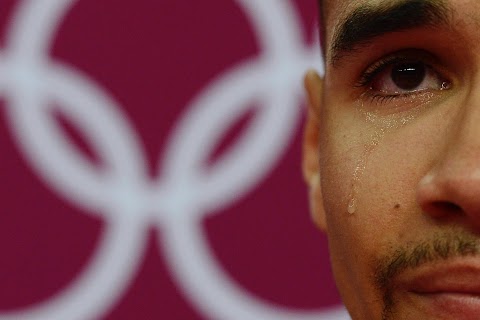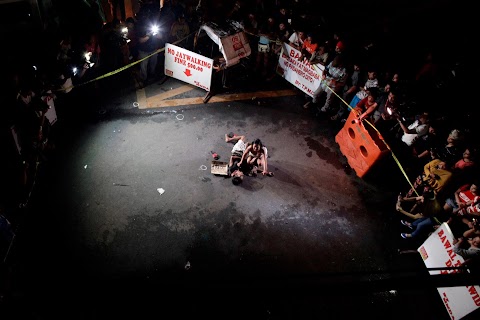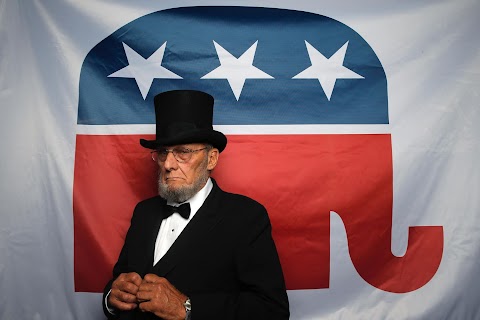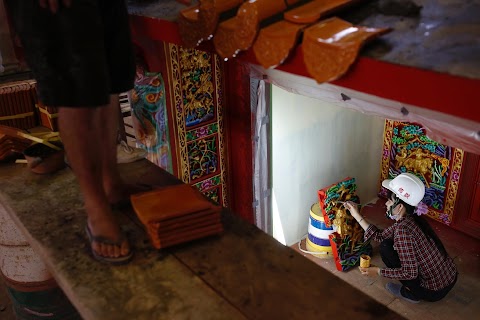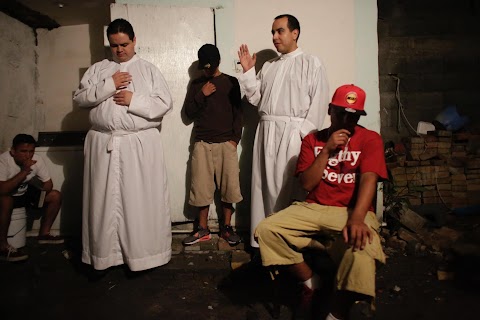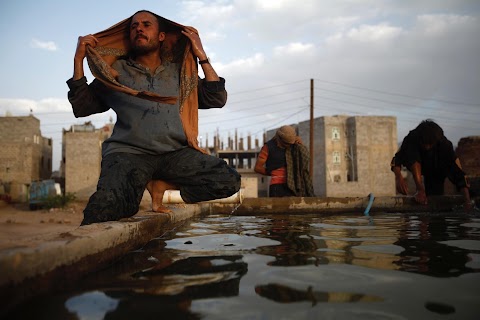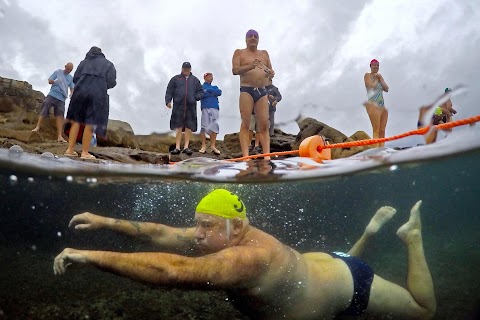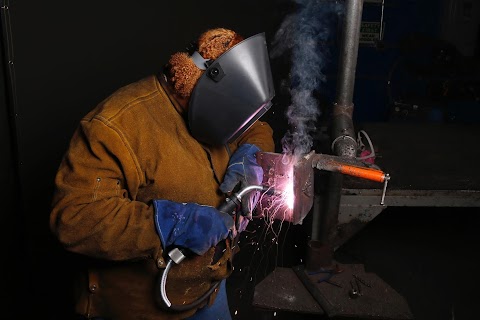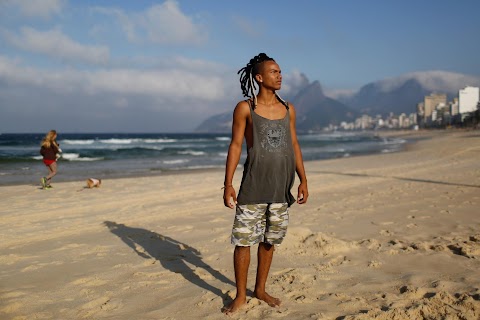
Cariocas reflect on the Olympics
 Pilar Olivares
Pilar Olivares
Story
Just days before Rio de Janeiro hosts South America's first Olympics, city residents expressed mixed feelings about the cost and security of the Games, while holding out hope they will bring joy to a nation facing economic and political crises.
The conflicted thoughts mirror a recent survey by the Datafolha polling group showing that half of Brazilians were opposed to holding the Games, while 63 percent think the costs of hosting the event will outweigh the benefits.
Posing at Ipanema beach, student and acrobat Guilherme Barbosa said: "Those in a position to rent out rooms in their houses can earn extra income, as well as those who work in the tourism industry. But most people are abandoned in precarious health and education services."
If there was a vote, he would cast against the Olympics.

Taxi driver Abner Lelis welcomed what Mayor Eduardo Paes touts as one of the Games' biggest legacies: improved transportation. "I spend almost the whole day driving and it is evident that traffic has improved," he said.
Lelis was quick to warn tourists, however, that some of his colleagues take the long way around to destinations for bigger fares.

Student Aline Santos sees the Games in a negative light, "because many people have been evicted from their houses for the construction of Olympic" works.

For 70-year-old poet Jorge Salomao, the Games will help Brazilians forget, for a moment at least, that they are facing their worst recession since the 1930s and that suspended President Dilma Rousseff is on the cusp of being ousted by an impeachment trial expected to end right after the Olympics close on Aug. 21.
"We are going through so many difficult times that the Olympics will bring a moment of joy and fraternisation in this city, the most beautiful city in the world," he said.

But for Dennis Claudinho, a 27-year-old construction worker who has helped build Olympic venues, the Games are a bittersweet reality in this nation still grappling with intense inequality.
He said he was confident the transportation infrastructure built, including express bus lanes and the extension of the subway, would bring much-needed improvements for the grinding commutes millions of Rio residents endure.
Yet working amid the dust at the Olympic Park as final touches were put on venues this week, he said: "I can't afford tickets for the Olympics because they are too expensive for me."
Slideshow

Pedro Grapiuna, a metalwork sculptor, said: "It is a good thing that lot of people will come from abroad to experience the good side of the city." He is also concerned about violence and poor infrastructure.

Jose de Jesus Damaceno, a 75-year-old fisherman, said: "The city is in crisis and there is no opportunity for anyone, the government should take more care of the population before spending money on an event like this."

"I'm unhappy with the Olympics at a time when the country is living with violence, I don't want to leave my home during the games," Danielle Bhering, a 32-year-old nurse, said. "It is difficult to accept this huge event with our polluted Guanabara Bay and the violence in the city."

"Rio de Janeiro will not change after this event. For the government the Olympic infrastructure has been more important than investing in improved services for the population," Antonio Mariano de Azevedo, a 25-year-old political advisor, said. "I am against the Olympics, the city is in crisis."

"I can't afford tickets to the Olympics. I need to work," Andre Barros, a 44-year-old street cleaner, said. "People will benefit from the improvement of public transport."

Manfred Kulitc, a 49-year-old mathematician, said: "I don't care too much about the Olympics, this country has no infrastructure for an event like this. The real problems of the population have not been resolved." He is also concerned for the safety of tourists.

Jeymerson Pereira, a 25-year-old butcher, said: "We don't need the Olympics, we need more schools and hospitals." He is also concerned that nothing will change for the poor in Rio de Janeiro. "We would need to change the government and start afresh."

Mauricio Nava, a 29-year-old skater, said: "There are visible improvements in the city such as to public transport and recreational spaces, if it wasn't for the Olympics, Cariocas (locals) would not have benefited."

Cristiane da Silva, a 33-year-old craftswoman, said: "I think it's a shame to hold the Olympics in this city where nothing has been done for poor people, where basic health services and education are precarious." She said the only benefit to hosting the Olympics was the renovation of the port.

Portuguese Fernando Olivera, a 68-year-old watchmaker, said: "The international image of Rio de Janeiro will improve with the Olympics, in the same way as the World Cup, the violence will go unnoticed."

Diogenes Paixao, a bar owner, said: "The Olympics will bring many tourists looking for fun and entertainment, I am only concerned about security on the streets."

Erinaldo Cardoso, a 43-year-old street performer, said: "Nothing will change after the Olympics. Everyone who knows the reality of Rio de Janeiro knows that it is not all happiness." He also is concerned that the jobs that have been generated will be lost after the games.

Gilberto Rabelo, a 74-year-old street vendor, said: "The Olympics will benefit only a few people" and he is concerned that violence will intensify when the event is over because there will be reduced security and police on the streets.

Maria Callou, a 35-year-old fashion designer, said: "I am glad about the Olympics and I think the problems of the country, such as corruption and violence, will go unnoticed during the event. We are hospitable people and we know how to bring joy and happiness to tourists."

Gabriela Galvao, a 40-year-old businesswoman, said: "The city of Rio de Janeiro always had bad services and the image of a disordered and violent city, but during the Olympics tourists will get the best impression because they come looking for fun."

Israel Mario da Silva, a 59-year-old watchman said: "I can't buy any tickets for the Olympics because they are too expensive for me." He also hopes the impact of the Olympics will be positive because Rio de Janeiro is now a better city with improved public transport services and the Olympic Park.

Nathalia Souza, a 18-year-old street vendor, said: "Brazil should first worry about solving internal problems, such as violence and poor public services, instead of investing huge amounts of money in infrastructure for the Olympic Games."

Silvana Batista (left), a 49-year-old retired nurse, and her mother Helena Batista are fearful and live in a slum that is in a constant battle between gangs. "We are living in hard and violent times in the city, we are concerned that all the security on the streets could not be enough," they said.

Ducinea Rancheiro, a 48-year-old street vendor, said: "I am not a person who identifies with sport, but it will be good because it has given people work by generating jobs mostly in the tourism sector."

Raquel Poti, a 32-year-old street artist, thinks the Olympics promotes a lifestyle that combines sport, culture and education. She is concerned about the large investment for the event while the population needs improvements in basic services.

Dayvison Nascimento, a 25-years-old bartender, said: "I expect many of tourists will come here and enjoy the energy of the city and the event", but he is concerned that police could not control effectively the violence in the city. He hopes the impact of the Olympics will be positive and Rio de Janeiro will improve its international image.

Marcos Da Costa, 46, said: "I don't agree with the Olympics while people in Rio suffer violence, bad health services, insecurity and construction works like the poorly-designed cycle path."

Xavier Fonseca, a 70-year-old sand sculptor, said: "It is a great opportunity for people who work in tourism." He also thinks that Cariocas (locals) will benefit from the public transport improvements made before the event.

Artist Wilson Alexandre said he did not buy any tickets for the Olympics because they are too expensive. He thinks of the Olympics as a big sporting celebration, with people enjoying the event the world over. At the same time he thinks of the evictions of people from poorer neighbourhoods, corruption and financial/project mismanagement.
